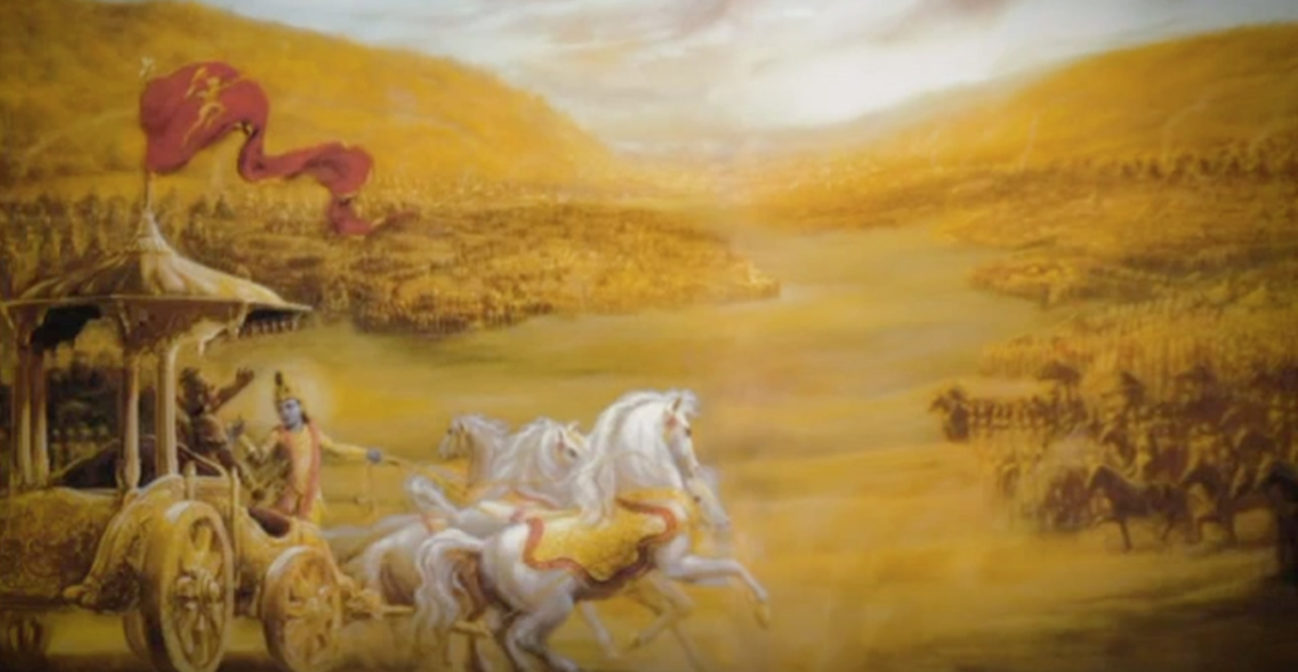Join us for conversations that inspire, recognize, and encourage innovation and best practices in the education profession.
Available on Apple Podcasts, Spotify, Google Podcasts, and more.

Translated by Barbara Stoler Miller
(Bantam Classic, 2004)
The First Teaching
Arjuna’s Dejection
Dhritarashtra
Sanjaya, tell me what my sons
and the sons of Pandu did when they met,
wanting to battle on the field of Kuru,
on the field of sacred duty?

Frontispiece image from a 1903 edition of The Bhagavad Gita .
Sanjaya
Your son Duryodhana, the king,
seeing the Pandava forces arrayed,
approached his teacher Drona
and spoke in command.“My teacher, see
the great Pandava army arrayed
by Drupada’s son,
your pupil, intent on revenge.Here are heroes, mighty archers
equal to Bhima and Arjuna in warfare,
Yuyudhana, Virata, and Drupada,
your sworn foe on his great chariot.Here too are Dhrishtaketu, Cekitana,
and the brave king of Benares;
Purujit, Kuntibhoja,
and the manly king of the Shibis.Yudhamanyu is bold,
and Uttamaujas is brave;
the sons of Subhadra and Draupadi
all command great chariots.Now, honored priest, mark
the superb men on our side
as I tell you the names
of my leaders.They are you and Bhishma,
Karna and Kripa, a victor in battles,
your own son Ashvatthama,
Vikarna, and the son of Somadatta.Many other heroes also risk
their lives for my sake,
bearing varied weapons
and skilled in the ways of war.Guarded by Bhishma, the strength
of our army is without limit;
but the strength of their army,
guarded by Bhima, is limited.
In all the movements of battle,
you and your men,
stationed according to plan,
must guard Bhishma well!”Bhishma, fiery elder of the Kurus,
roared his lion’s roar
and blew his conch horn,
exciting Duryodhana’s delight.Conches and kettledrums,
cymbals, tabors, and trumpets
were sounded at once
and the din of a tumult arose.Standing on their great chariot
yoked with white stallions,
Krishna and Arjuna, Pandu’s son,
Sounded their divine conches.Krishna blew Pancajanya, won from a demon;
Arjuna blew Devadatta, a gift of the gods;
fierce wolf-bellied Bhima blew Paundra,
his great conch of the east.Yudhishthira, Kunti’s son, the king,
blew Anantavijaya, conch of boundless victory;
his twin brothers Nakula and Sahadeva
blew conches resonant and jeweled-toned.The king of Benares, a superb archer,
and Shikhandin on his great chariot,
Drishtadyumna, Virata, and indomitable Satyaki,
all blew their conches.Drupada, with his five grandsons,
and Subhadra’s strong-armed son,
each in his turn blew
their conches, O, King.The noise tore the hearts
of Dhritarashtra’s sons,
and tumult echoed
through heaven and earth.Arjuna, his war flag a rampant monkey,
saw Dhritarashtra’s sons assembled
as weapons were ready to clash,
and he lifted his bow.He told his charioteer:
“Krishna,
halt my chariot
between the armies!Far enough for me to see
these men who lust for war,
ready to fight with me
in the strain of battle.

Krishna in part-god form driving Arjuna’s chariot.
© 2010 JupiterImages Corporation
I see men gathered here,
eager to fight,
bent on serving the folly
of Dhritarashtra’s son.”When Arjuna had spoken
Krishna halted
their splendid chariot
between the armies.Facing Bhishma and Drona
and all the great kings,
he said, “Arjuna, see
the Kuru men assembled here!”Arjuna saw them standing there:
fathers, grandfathers, teachers,
uncles, brothers, sons,
grandsons, and friends.He surveyed his elders
and companions in both armies,
all his kinsmen
assembled together.Dejected, filled with strange pity,
he said this:
“Krishna, I see my kinsmen
gathered here, wanting war.My limbs sink,
my mouth is parched,
my body trembles,
the hair bristles on my flesh.
The magic bow slips
from my hand, my skin burns,
I cannot stand still.
my mind reels.I see omens of chaos,
Krishna; I see no good
in killing my kinsmen
in battle.Krishna, I seek no victory,
or kingship or pleasures.
What use to us are kingship,
delights, or life itself?We sought kingship, delights
and pleasures for the sake of those
assembled to abandon their lives
and fortunes in battle.They are teachers, fathers, sons,
and grandfathers, uncles, grandsons,
fathers and brothers of wives,
and other men of our family.I do not want to kill them
even if I am killed, Krishna;
not for kingship of all three worlds,
much less for the earth!What joy is there for us, Krishna
in killing Dhritarashtra’s sons?
Evil will haunt us if we kill them,
though their bows are drawn to kill.Honor forbids us to kill
our cousins, Dhritarashtra’s sons;
how can we know happiness
if we kill our own kinsmen?The greed that distorts their reason
blinds them to the sin they commit
in ruining the family, blinds them
to the crime of betraying friends.How can we ignore the wisdom
of turning from this evil
when we see the sin
of family destruction, Krishna?When the family is ruined,
the timeless laws of family duty
perish; and when duty is lost,
chaos overwhelms the family.In overwhelming chaos, Krishna,
women of the family are corrupted;
and when women are corrupted,
disorder is born in society.This disorder drags the violators
and the family itself into hell;
for ancestors fall when rites
of offering rice and water lapse.The sins of men who violate
the family create disorder in society
that undermines the constant laws
of caste and family duty.Krishna, we have heard
that a place in hell
is reserved for men
who undermine family duties.I lament the great sin
we commit when our greed
for kinship and pleasures
drives us to kill our kinsmen.If Dhritarashtra’s armed sons
kill me in battle when I am unarmed
and offer no resistance,
it will be my reward.”Saying this in the time of war,
Arjuna slumped into the chariot
and laid down his bow and arrows,
his mind tormented by grief.

Krishna, mighty and powerful, instructing Arjuna.